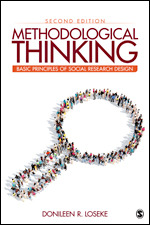Methodological Thinking
Basic Principles of Social Research Design
- Donileen R. Loseke - University of South Florida, USA
Focused on the underlying logic behind social research, Methodological Thinking: Basic Principles of Social Research Design encourages readers to understand research methods as a way of thinking. The book provides a concise overview of the basic principles of social research, including the characteristics of research questions, the importance of literature reviews, variations in data generation techniques, and sampling.
The Second Edition includes a revised chapter on research foundations, with focus on the philosophy of science and ethics; an emphasis on critical thinking; additional attention to evaluating research; and a new selection of briefer, multidisciplinary journal articles designed to be accessible to a wide variety of readers.
Supplements
EXCLUSIVE! Access to the full-text SAGE journal articles used as examples in the book.
Methodological Thinking is a highly accessible, practical guide to the often-intimidating process of designing a research project. An excellent starting point for an undergraduate course in social research fundamentals, full of useful examples and uncomplicated explanations of the starting stages of the research process.
This concise, approachable book with clear examples from published articles is a useful supplement to long, detailed, technical methodology texts that students sometimes find overwhelming and inaccessible.
The second edition of Methodological Thinking has only improved upon the first edition, by focusing more attention on critical issues related to sampling and ethics, along with a broader examination of the epistemology underlying social science research. This book is useful as a “go-to” reference on designing social science research and is excellent as a primary text at all levels of college.
Methodological Thinking helps students move past their preconceptions of research to critically engage in research design while enhancing skills that will help them evaluate information in their daily lives.

